Best SEO keyword research tool of 2024 - TechRadar
The best SEO keyword research tools make it simple and easy to identify important business keywords for your website and optimize for them.
This is especially important for better understanding how to develop targeted traffic streams for your website. This means being aware not just of which keywords to target, but also cross checking them against the keywords people are actually using.
The result is that keyword research tools are especially helpful to businesses, agencies, and website owners when it comes to trying to improve their Search Engine Optimization (SEO).
There are a number of tools available to help provide not just keyword search data, but also generalized traffic analytics for giving you an idea of potential traffic volumes for ranking well against these. Additionally, some keyword ranking tools rate keywords based on competitiveness, to provide information on the difficulty level of targeting them.
On top of all this, the best keyword search tools provide suggestions of related keywords to research as they may provide a better fit between your intended audience and your product or services. Some of the tools even go as far as making suggestions based on your existing pages, in order to help improve the targeting and ranking.
Below we list the best SEO keyword research tools currently available.
We've also featured the best free SEO keyword research tools.
Why you can trust TechRadar We spend hours testing every product or service we review, so you can be sure you're buying the best. Find out more about how we test.
Best overall
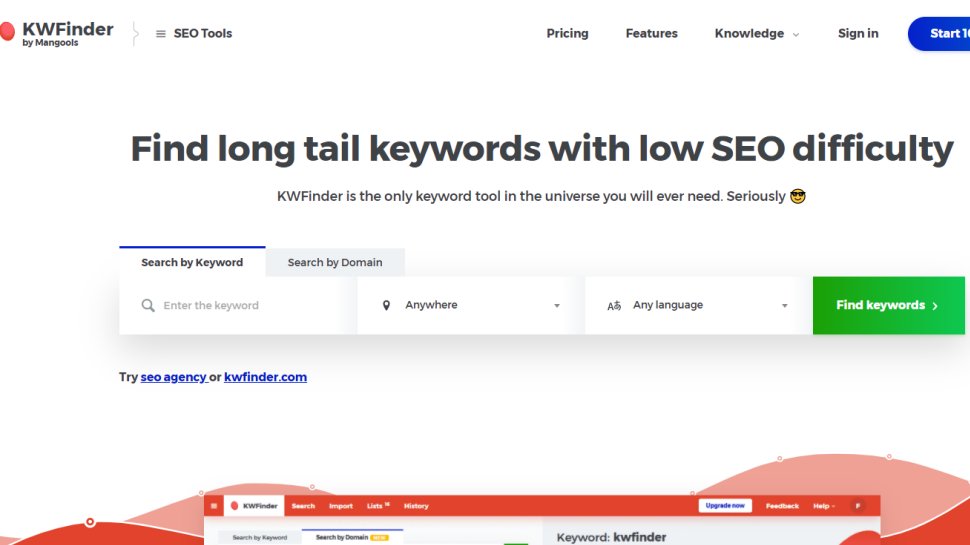
KWFinder features the ability to target longtail keywords that may be easier to rank well for while still providing targeted traffic. Not only can you apply a keyword analysis for your own website, but you can also analyze the rankings of other websites, so you can better gauge the competition.
Not only does KWFinder provide keywords to search for, it also includes a lot of key metrics for keyword analysis, including search volumes with historical data. This allows for the identification of long-term trends as well as seasonal keywords you can set up a schedule to target at the right time.
You can also search for local keywords by location in order to analyze what people are searching for in your area, in order to better target customers, especially when engaged in the sales funnel.
At present the software supports tracking of over 2.5 million keywords and supports 52,000+ geolocations.
As a general SEO platform KWFinder may not be as strong as some others, but as a keyword research tool it is excellent.
Read our full KWFinder review.
Best for analysis
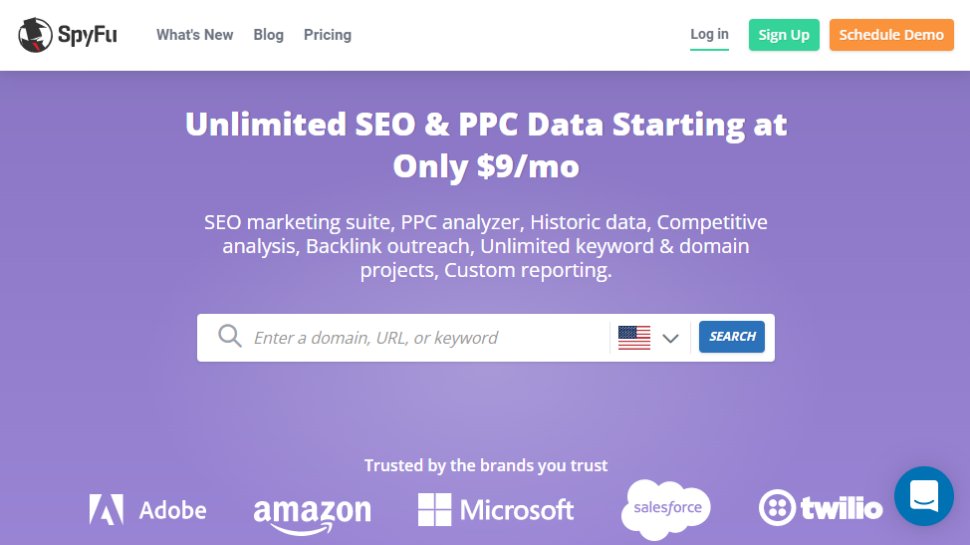
SpyFu specializes in providing a database of keywords based not just on organic rankings, but also of keywords used with Google Adwords. The result is the ability to track both keywords and the keyword variations used by competitors, in organic and paid search, creating a powerful analysis and keyword research platform.
The keyword research tool itself offers to provide deeper insights than Google's own keyword suggestion tool, with the ability to not just track ranked keywords but also keywords used in PPC campaigns. This means you can source both sets of information for your own keyword research.
Even better is the ability to identify transactional keywords so you can focus on those keywords that convert traffic better, allowing for keyword quality rather than quantity. You can also distinguish between keywords used for both desktop and mobile devices.
While many SEO tools give preference to organic search, SpyFu also provides a lot of PPC data to filter through, making for a far more comprehensive keyword research tool.
Although there's no free trial available, Spyfu's paid plans all offer unlimited keyword research volumes, with the only difference between paid plans dependent on the numbers of sales leads and domain contacts, top lists, and API rows returned.
Read our full SpyFu review.
Best suggestion tool
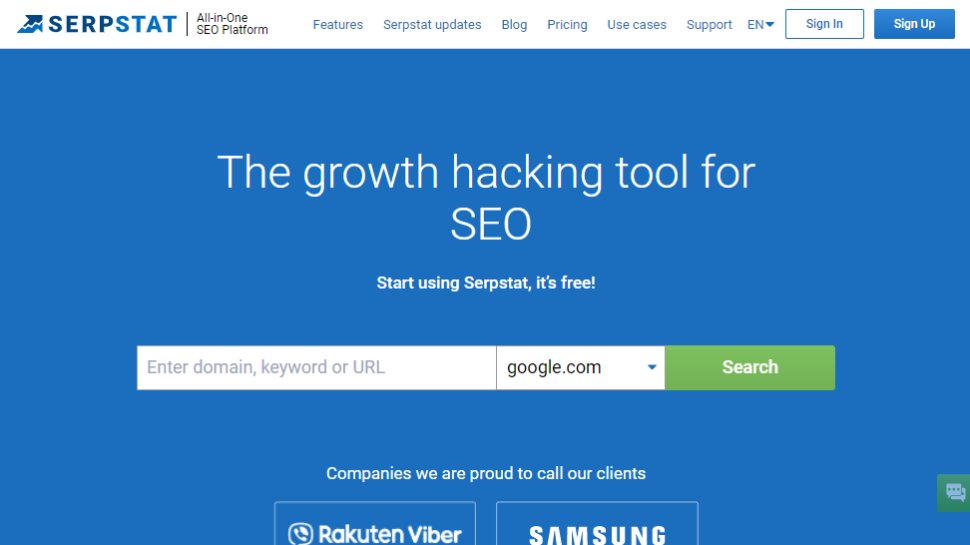
The Serpstat Keyword Research tool offers a great platform from which to cover a range of different keyword search and research options.
One feature includes the ability to do competitor research using URL analysis in order to identify keywords potentially missing from your campaigns. Additionally, you can use search questions in order to research specific keyword niches, and come up with further keywords and other ideas for driving targeted traffic to your website.
One of the more interesting options is the "tree-view" to see how keywords are distributed on your pages. While most target specific keywords at a specific page, sometimes a different page might end up with better ranking potential, such as by going viral. This tool aims to help you identify other useful pages which, if targeted instead, might improve your targeted ranking for those keywords.
Like other tools there's also the option to search for related keywords, but on top of this there are a number of filters you can use to narrow your selections into the most useful keywords to target.
Starter plans for a single user allow full access to Serpstat tools and data. Pricing is otherwise based on the number of users, so other payment plans are for when multiple users are required to access the account.
Overall, Serpstat offers a lot of flexibility when it comes to keyword research, and the ability to use different tools and methodologies can only be empowering for website owners and SEO's alike.
Read our full Serpstat review.
Best for testing
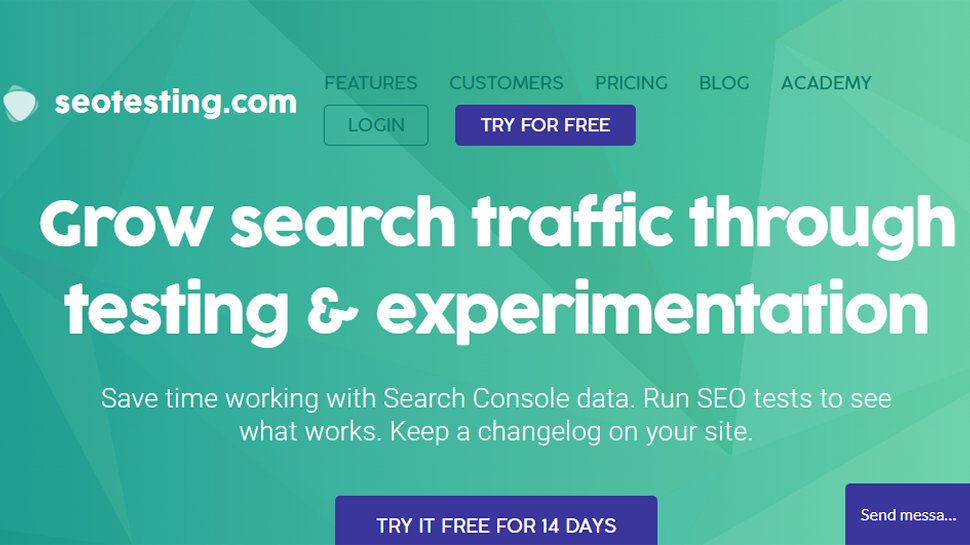
SEOTesting,com isn't so much a keyword research tool for finding out which keywords you don't use, as a way to optimize for the keywords you do. Essentially, it uses your Google Search Console data to generate reports, allowing you to look more closely at the keywords you are already targeting, their performance, as well as providing genuinely useful suggestions.
However, SEOTesting.com doesn't really offer much more than this which makes its usefulness as a standalone potentially limited, especially when there are big SEO platforms out there that also provide keyword research suggestions.
Even so, it manages to provide a very useful niche service. The caveat is that it may not offer the same value to big business or SEO agencies who already have access to a major SEO toolkit platform, but SEOTesting.com could make a handy keyword research tool for small business owners and individual webmasters who would like a hands-on approach to SEO without having to spend too much money.
Read our full SEOTesting.com review.
Best for topics

Answer The Public offers an innovative way in which you can discover current keyword trends in order to improve your keyword targeting by providing additional ideas.
Although there are over 3 billion Google searches a day, up to 20% of these are unique and won't appear on traditional keyword difficulty and analysis platforms. By using Answer the Public you can see these important searches and keyword suggestions in order to improve the relevance of your own SEO campaign.
This is not least because you can get a better idea not only of what topics people are searching for on Google, but also gain some insight into what they are thinking. This makes Answer the Public a valuable tool not just for SEO agencies, but also for those involved with general marketing and PR.
Even better, a free tier allows you to explore the service, though with limits on the volume of keyword searches. If you like what you see, opting for a paid plan allows for unlimited searches, users, and historical metrics.
Best free
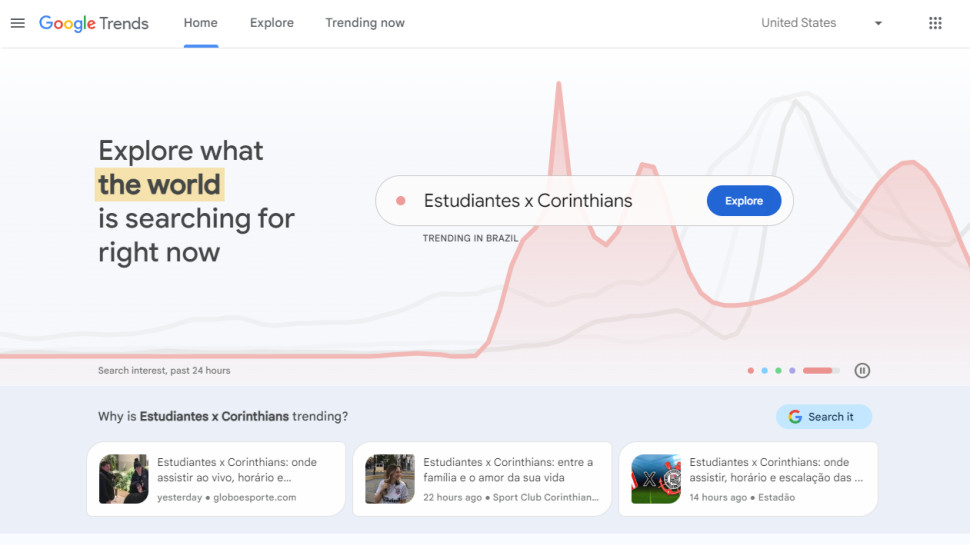
While Google offers its own keywords suggestion tool for Google Ads PPC campaigns, perhaps its most valuable tool for keyword insights is Google Trends. This is especially as the internet is a constantly changing and developing medium, and identifying clear patterns in search behavior early enough could provide a long-term competitive advantage.
For example, a sudden rise in search traffic for a particular product or service might offer an opportunity to be targeted through a range of marketing channels, not just for SEO. This was the case during the corona virus pandemic, when working from home led to an increase in a wide range of search terms relating to remote working software, and work from home equipment such as laptops.
While that is an extreme example, even under normal conditions celebrity endorsements, new product releases, and changes to consumer behavior (often driven by new technologies) means that being able to identify such trends can be valuable.
Google Trends offers probably the biggest window on this, not just allowing users to search for specific keywords and identify the trends associated with them, but also by openly providing ongoing trends and highlights. This allows marketers to be able to tap into Google's search data directly for key insights.
Best of all, like all of Google's other SEO tools, Google Trends is free to use. However, the caveat here is that unlike paid-for tools, it means that you're unlikely to be able to work with keywords by volume without being able to connect with the Google Trends API, which in itself adds development costs.
Best simple
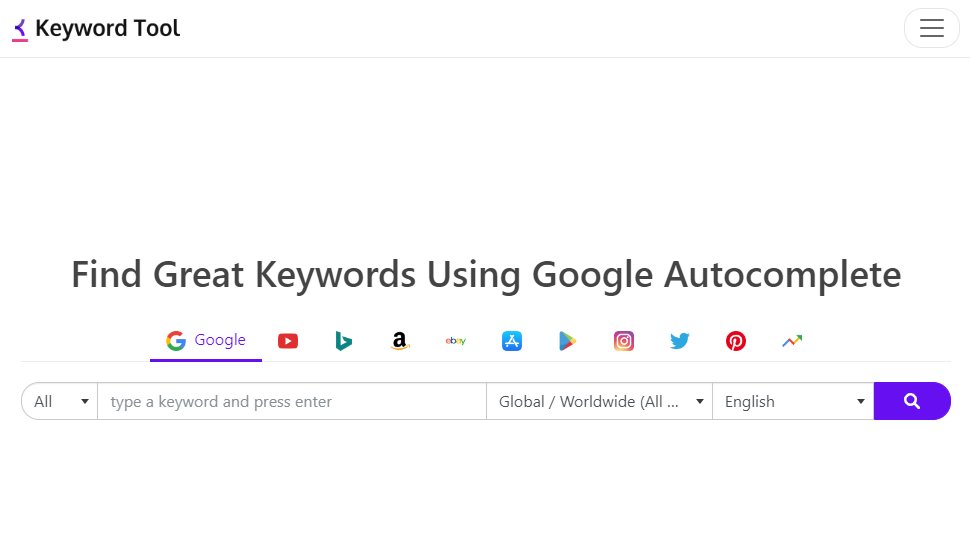
Keyword Tool is a strong entry into the keyword research category for SEO optimization. It not only analyzes data related to keywords across Google, but also other important sites, such as Amazon and YouTube.
Unlike some other services, Keyword Tool is all about keywords, and does not cover your needs if you're really after an all-in-one SEO service. Compounding this issue is that the service is priced closer to a more comprehensive service. Specifically, the pricing starts at $89/month for the Basic plan, but the availability of an annual discount with a commitment can help with this. Plans are based around the number of keywords that can be searched in a day, the number of user accounts, and the number of API requests each day. Furthermore, the higher plans add in services including cost-per-click data, and Google Ads Competition data.
While other keyword finders may do it differently, Keyword Tool has a novel way of finding appropriate keywords, using the Google Autocomplete algorithm. This finds keywords popular for a specific market, and is also applied to other less broad search engines, such as Amazon and eBay. This software then presents data around each keyword, such as a single number to indicate the competitiveness of the search term.
Read our full Keyword Tool review.
We've also featured the best onpage SEO tools.
SEO keyword research tool FAQs
How to choose the best SEO keyword research tool for you?
When deciding which SEO keyword research tool to use, first consider what your actual needs are, as budget options may only provide basic features, so if you need to use advanced tools you may find a more expensive platform is better suited to you.
Additionally, higher-end SEO software usually includes a range of ranking and content tracking options, along with a comprehensive tool box to suit every need, so do ensure you have a good idea of which features you think you may require from your keyword research tool.
How we tested the best SEO keyword research tools
To test for the best SEO keyword research tools we first set up an account with the relevant software platform, then we tested the service to see how the software could be used for different purposes and in different situations. The aim was to push each keyword research tool to see how useful its basic features were and also how easy it was to get to grips with any more advanced SEO options.
Read more on how we test, rate, and review products on TechRadar.
Get in touch
- You've reached the end of the page. Jump back up to the top ^
Comments
Post a Comment